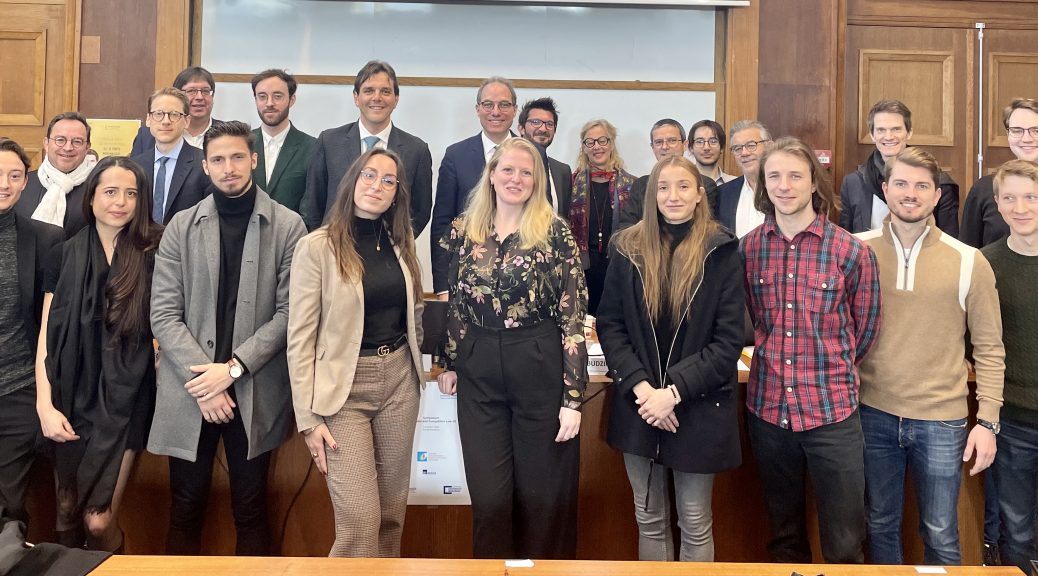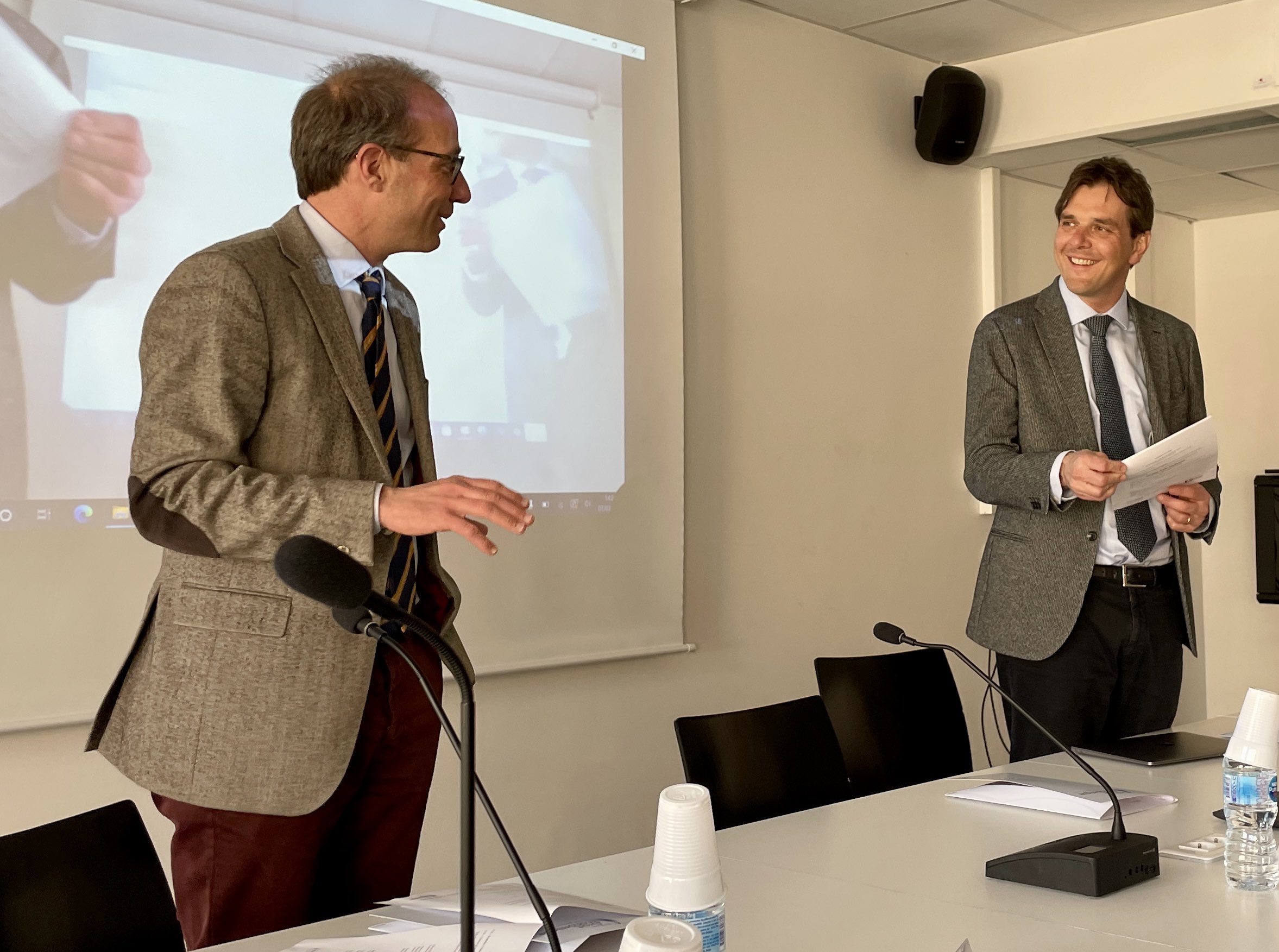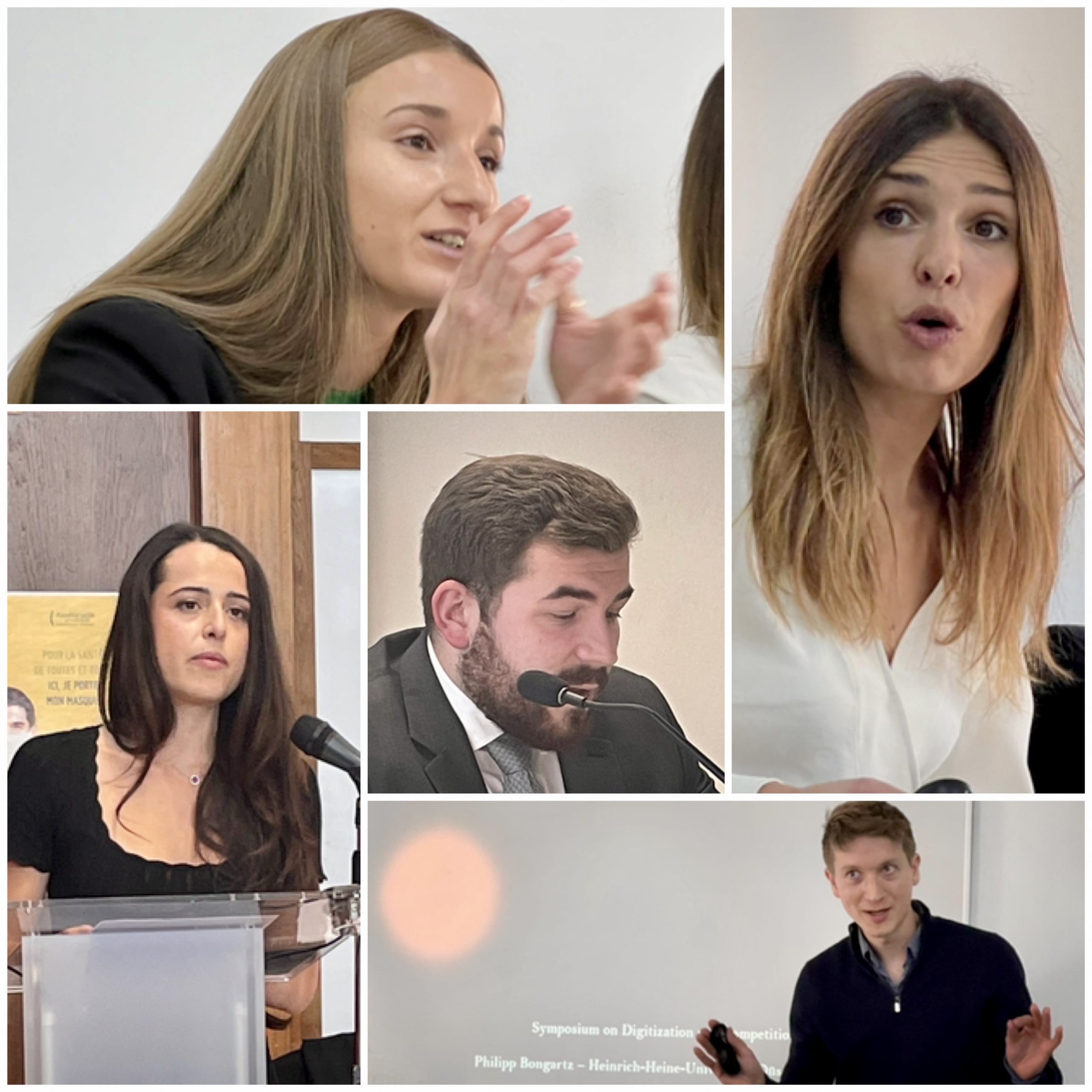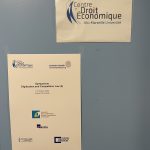
Conference Debriefing (29): The DMA, Inside and Beyond
Trilogue negotiations at Brussels on the Digital Markets Act are coming to an end, or so we believe – a final compromise is expected at the end of this month. While waiting for words to dissect, scholars from France and Germany met in Aix-en-Provence to discuss “The DMA, Inside and Beyond”. Rupprecht Podszun, who currently serves as a Visiting Professor at the largest law faculty of the French speaking world (that is l’Université Aix-Marseille) gives us the details in this Conference Debriefing interview.
Name of Event: “The DMA, Inside and Beyond – Symposium Digitization and Competition Law (II)”. The II signalizes that there was a first edition, it was the Winter School 2021 in Würzburg that Florian Heimann reported on here.
Topic: The name speaks for itself, doesn’t it?
Place & Time: 7-9 March 2022, Aix-en-Provence. If this brings you the taste of Rosé wine on your palate, the scent of lavender in your nose, the warm tickling of the sun on your skin and the sound of crickets chirping in your ears, you are just about right – with the wine. For the rest, please return in Spring or Summer!
Host: The Sympozium was hosted by the most generous professor David Bosco, a household name in French competition law and the director of the Centre de Droit Économique at Aix. He invited scholars from France and Germany. Actually, he cooperates with professor Florian Bien from Würzburg University whose immaculate French and his impressive knowledge of Aix are an asset. Bosco/Bien were supported by the Université franco-allemande/Deutsch-Französische Hochschule.

I take it that English is the lingua franca when French and German scholars meet?
Bien sûr! Or at least, what everyone thinks sounds like English. But since there were no native speakers around no one felt bad about his or her language skills. And the menu in that Japanese restaurant that we went to was unintelligible to anyone anyhow unless, of course, you were trained in Düsseldorf’s Immermannstraße, that hot spot of Japanese food.
Pardon?! The French took you to a Japanese restaurant in Aix-en-Provence?! Mon Dieu!
C’est pas un drame. Of course, David Bosco also took us to a decent three-courses-lunch avec des délices, but globalization is taking its toll. I overheard a French PhD student saying: “You should not leave Aix without having had a Pizza Capri!” Oh, I forgot to mention Nathalie Nielson when speaking about language, she is a bi-lingual PhD student in economics from Nice University. She discussed the removal of the so-called free speech app “Parler” from the app stores of Google and Apple and the cloud of Amazon’s AWS which essentially meant the end of that Trump-supporting outlet.
Not a big loss if you ask me.
But a good example how Big Tech’s private power may regulate competition and free speech at the same time. It was legendary Oliver Wendell Holmes jr., joined by the most fashionable Louis Brandeis, in a dissenting opinion in the case Abrams v. United States (250 U.S. 616 (1919)) who came up with the idea of a free “marketplace of ideas” that Nathalie tries to revive.
Brandeis, aha. The judge-turned-hero of “progressive antitrust”, or, as the French would possibly say, “le nouveau dirigisme”!
He also featured in an inspiring talk given by Frédéric Marty who drew the great lines of history in regulating (quasi-)utilities – tracing the Digital Markets Act back to ideas born in the Glorious Revolution in England in 1688 or in American independence in the 18th century. The legacy of not granting monopoly or regulatory power to private companies is, according to Marty, an idea that is very much enshrined in a certain thread of history. Thomas Jefferson and Alexander Hamilton discussed regulation issues back in 1790, striking a famous compromise (as you may remember from that musical). 150 years later, Thurman Arnold, the US trustbuster, published “The bottlenecks of business” – “we speak of gatekeepers these days”, as Marty observed. The DMA’s ambition is nothing new.
So, French scholars subscribe to regulation? The DMA is a pet project of the French presidency of the European Union anyway.
Not so sure. Pierre Bentata, an economist from Aix-Marseille University (AMU) is very skeptical: He said that business users may be better off with the DMA, but that is not of concern for economists, since this is just wealth distribution. New ecosystems, so he thinks, will not be helped by the DMA, and the DMA may even decrease consumer welfare, for example through lower interoperability. Predictable adverse effects ahead, Bentata thinks.
Phew. Time to start disliking the DMA?
Depends on what you wish for. Oliver Budzinski of TU Ilmenau reminded us that the DMA is not a competition law or consumer welfare tool – it is about “contestability and fairness”. Contestability, so he explained, is a well-established concept in economics that William Baumol wrote about. Budzinski explained it with “hit and run entry” – and exit. In the theory of contestable market, potential competition suffices to get things right, so it is – essentially – a theory that does not invite an active policing of markets. Yet, Budzinski also said that Baumol later re-interpreted his ideas, found that sunk costs were everywhere and that entry and exit were not as simple as thought before. Potential competition may be a tougher cookie than in the first models. So if Baumol was asked today, he would probably advocate an active competition policy. Well, Baumol died five years ago, he will not prove Budzinski wrong.
Fair enough. And fairness?
We have to wait. The Ilmenau project on this that Oliver pursues with Juliane Mendelsohn is still ongoing. They better come up with a good explanation soon since “fairness” needs some contouring in the DMA: Maya-Salomé Garnier from AMU warned us that the DMA may run into rule-of-law trouble. She gave a powerful statement pointing at some weaknesses where she thinks that proportionality of fines may not be given, the margin of discretion may be too large for the enforcer, stability of rules may only work in the short term, not in the long run, when the Commission will rely more strongly on circumvention provisions and update tools in the DMA (and don’t ask her about separation of powers when discussing the Commission’s competences).
So, the Court of Justice in Luxembourg will scrap the whole DMA?
I don’t see that for now, but some guidelines would be of help to reduce the risk. David Bosco, in his talk, went into a similar direction, stating that the notions of gatekeepers, undertakings, core platform services were not coherent in the DMA, not least with a view to the recent Sumal ruling of the Court. His talk was a good reminder that we now turn from the more general discussions to the nitty-gritty details that will be of enormous relevance for implementation and compliance. Enough work on the desk for inhouse lawyers! Microsoft’s Marc Mossé who is an Associate Professor at AMU and a man of many talents, promised that the gatekeepers will really try to comply.
I know that you love the enforcement aspects. Any news on this?
Not from me, I spoke on data, but Florian Bien (Uni Würzburg) and Rafael Amaro (Uni Caen – online) helped out. Co-host Florian Bien warned that the fragmentation of laws in the EU will not be stopped with the wording as it stands in the DMA. He suggested that the Commission amend Art. 3 of Regulation 1/2003 in order to stop national agencies from interfering with DMA investigations. Rafael Amaro supports – as I do – a strong private enforcement system for the DMA and is stunned that there was nothing on this in the Commission’s draft. The competition law rules on private enforcement are out of reach (since, as we know, the DMA is not a piece of competition legislation). He outlined different models of private enforcement. In any case we are eager with anticipation when the Landgericht Dortmund takes the first infringement decision on Art. 5 DMA – possibly without a preliminary reference to the Court of Justice.
I notice a certain gap in looking at the substantial provisions of the DMA. Anyone discussing this?
Philipp Bongartz from my own research team is on it, and I tell you: You do not want to do the deep-dive into this stuff. Not that Philipp’s presentation was boring, he masters the art of presenting!
So, then what?
Anti-steering clauses essentially prohibit to steer a customer away from someone, for example by communicating better offers to the customer. Spotify for instance is not allowed to inform Apple users about some good offer on its website. That is Philipp’s interest, but it is not just an issue for the DMA. Competition law, the VBER, section 19a of the German Act, privacy rules, transparency obligations and the Consumer Rights Directive all play into this. Who the heck should keep abreast with all these rules? Well, Philipp, probably. But it is hard to see a coherent regulatory regime at play in the digital world.
Relationship status: It’s complicated!
You name it. And Thibault Schrepel will deliver the theory for this. In his unique style of beautiful presentations he offered a look into a paper, co-authored with Nicolas Petit, on the need of antitrust law to use complexity science as a method. There is some Charles Darwin in this (which I like), some criticism of economics (which the economists in the room dismissed), and it comes down to more data use, more computing, more ex-post-analysis in antitrust – an agenda, that is probably less controversial than some of the arguments in the build-up to this.
You talked about data, right?
Eckart Bueren, professor at the University of Göttingen, and I both did. We see the EU Data Act as the next big thing, once we have cooled down from the DMA. You may remember the conference in Düsseldorf we had on this, including the heated debate on data in the automotive sector. Now, there is the Commission’s draft for rules on access to data. This will not meet with unison acclaim like the DMA, I guess. The DMA, in Parliament and Council, profited from that clear line against the GAFAMs – no big harm in sight for stakeholders in your constituency. In the EU Data Act, powerful interests of European firms are at stake, the battle will be harder.
You still speak of GAFAM despite of Alphabet and Meta?
Indeed! MAMAA has not gained any ground in this conference!
Speaking of M: What did Marc Mossé talk about?

His was an interesting submission on the big M-topic. But let me first rush you through the rest of the programme: Marie Cartapanis, Maître de conférences at Aix-Marseille Université, discussed attention markets in digital ecosystems – you know we are still trying to get the market definition right. Lylian Denis discussed the remedies in Google Shopping. Inès Guittard talked about gaps in merger control – and how the Commission tries to close them with its Article 22-interpretation. The latter two PhD-candidates Aixoises were complemented by post-doc Björn Becker from Würzburg (online) who presented section 39a of the German Competition Act in the context of killer acquisitions – 39a does not help in this regard, as he rightly stated. One innovation struck me after the talks by Inès and Björn.
Dis-donc, I mean, disclose it, please!
Moderator Florian Bien made a “flash-round” and forced the younger participants to utter their thoughts on the merger control talks. And, hear, hear, they all had meaningful statements to make!
Come on, what did you expect?
Not much, to be frank, they had been silent most of the time which meant that Thibault Schrepel, Oliver Budzinski and I played the wisenheimers all the time. Thibault and Oliver are a great conference couple, by the way, they always have very interesting ideas on talks, and usually opposing ones!
Will invite them next time, I organize something. If only the conference circuit was in full bloom again!
It will never be the same. The good thing is: It does not even need to be the same since we soon meet with our avatars on Barbados to hold a competition conference – in the Metaverse, of course!
That’s the big M of Marc Mossé’s talk?
Absolutely. It seems that the Metaverse fires up the imagination, even though there are not too many people who can explain what exactly that is, whether it already exists and why we should all go there. At least for some, Marc Zuckerberg’s introduction video (short version here) was either boring or gruesome, but, hey, who am I to judge – D’Kart does not even run a TikTok-account. The point Mossé made was interesting nonetheless: The whole point of the Metaverse is to integrate ever more products and services and persons and places into a merged universe of virtual and real. This means more personalization, more data, more power to some. If we think, the digital gatekeepers are a problem these days, we may wonder what the Metaverse will be.
Oh là là! Don’t know what to make out of that…
Keep calm, ça va. Two days after the end of the conference, Le Monde, the French daily, ran an article on the positions of Macron and his contenders for the French presidency vis-à-vis “le numérique” (which is French for “digital”). The presidential candidates in essence all agree on the DMA, and Macron in particular places this in the context of his project of “souveraineté européenne”. Yet, the article in that same issue of Le Monde on the defeat of Paris Saint-Germain in the Champions League was double the length of that piece on “le numérique”. So, there are other things in real life that are even more important than our regulatory business or the Metaverse. Le foot, for instance.
And the food!
Oh, it’s time for the apéro. À plus!
The author: Rupprecht Podszun holds the Chair for Civil Law, German and European Competition Law at Heinrich Heine University Düsseldorf. In February/March 2022, he is a Visiting Professor at the Aix-Marseille Université. Later this month, he is Global Law Professor at KU Leuven. If you understand German, you may subscribe to his podcast with Justus Haucap “Bei Anruf Wettbewerb” (available in all podcast apps). And don’t forget to subscribe to the e-mail alerts on new postings on this blog – here!







